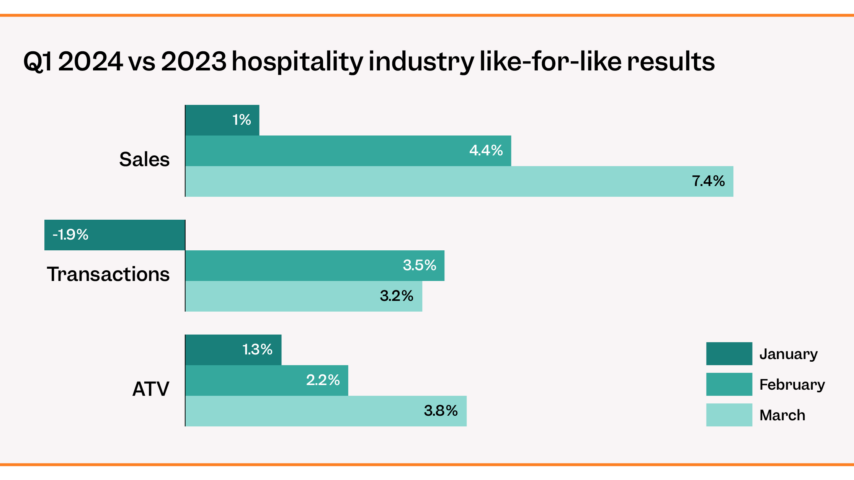In this article
- Lesson 1 - People: If you donât look after your people - you canât recover
- Lesson 2 - Customer: The customer is always right (duh!)
- Lesson 3 - Sales: Never stop selling!
- Lesson 4 - Product: Look at where the ball is going
- Lesson 5 - Engineering: Scalability is key
- Lesson 6: Funding - Cash is King
- Where did we end up?
- Whatâs next?
Tenzo’s co-founders Christian Mouysset and Adam Taylor reflect on a truly unprecedented year.
This chart shows how things were looking in the middle of April, a couple of months into the pandemic – this is the story of what we did about it:
Daily sales of London based restaurants, GBP
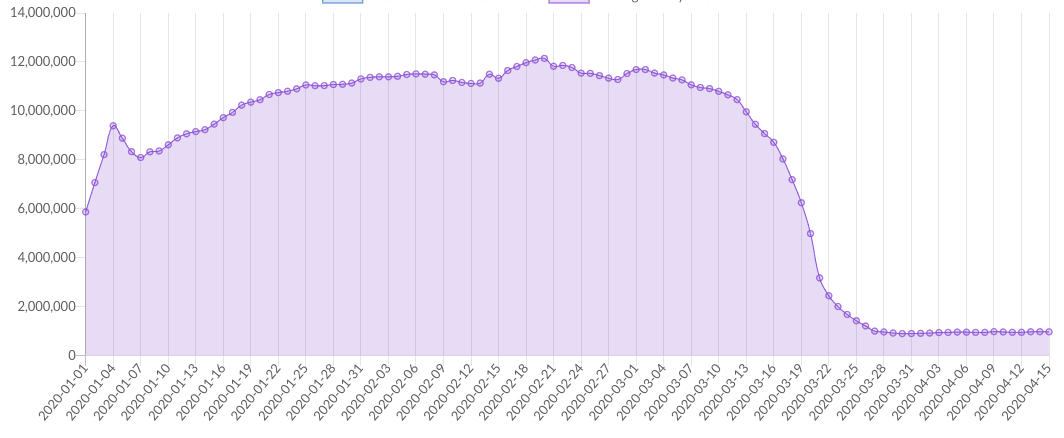
No one can say that 2020 was uneventful, that’s for sure. Way back in January, Tenzo was growing 10% month-on-month, and we were gearing up to expand. Coronavirus was on our radar – but felt like something overseas that wouldn’t impact us. Then the UK announced its first case – and as we all know, the rest is history.
As you can see above – restaurant sales were in rapid decline and we lost ~80% of our revenue in the matter of a few weeks. It required some serious soul searching to figure out what we should do. We found that we learned a lot and wanted to share and reflect on some key lessons from the pandemic.
Lesson 1 – People: If you don’t look after your people – you can’t recover
Our first reaction was to protect our most valuable asset – our people. We moved quickly to allow our teams to work from home to minimise their contact with others. Soon this meant we had a team that spanned the world as people wanted to be close to loved ones – from Thailand to Wales, North Carolina to Cambridge, Dorset to Ukraine. Critically, we’ve found 3 things to be important to our success in this new remote world:
-
Have the right tools and processes: Clearly, this new world requires new ways of working – we had to park our beliefs that teams are more effective in person, and find ways to make remote teams work. Obvious tools like Slack and Zoom have been coupled with operational process changes – a shorter dev sprint cycle, more regular daily check-ins and creating space for “brainstorming”.
-
Find new mechanisms for “social connectedness”: Every week now at Tenzo you’re assigned a cross-functional coffee group – the idea is to try and enable more “water cooler” conversation and build social groups. We’ve also played virtual escape rooms, adopted virtual lunch ‘n’ learns, and who doesn’t enjoy some team Among Us?
-
Reinforce your values: we’ve spun up a “values squad” who continue to evolve our values and make sure we’re living them daily. At its core – a group with a common value set will continue to stay together and function effectively – we believe this is core to our success.
We’ve worked hard to make sure that the team felt supported and remained productive during this time – 2020 has proven to be a tricky balance of health, family and work commitments – and we’ve had to reinforce that throughout.
Lesson 2 – Customer: The customer is always right (duh!)
Our main message: “If you’re closed – Tenzo is FREE”
Our second reaction was to do everything we could to support the industry. Given that we have first-hand experience of running restaurants, we knew that bills would be impossible to pay with no revenue coming in. We didn’t want to add to the increasing pressure, so we quickly communicated to our customers that we would pause their billing if they were closed. Our key learnings from a customer success point of view were:
-
Proactive is best: We were one of the few vendors to proactively tell our customers they didn’t need to pay. Even before the second UK lockdown was finalised, we had a communication plan in place, and customers couldn’t have been more grateful.
-
Empathy wins – and can go both ways: Our customer success team knew they had to put themselves in the shoes of the customer – but also with a realisation that we all have businesses to run. Helping understand each others’ pain helped us get more customers back to billing faster.
-
Have a regular communication strategy: We launched a weekly newsletter for our customers with our latest tips on how to get their products & services to their customers. A theme throughout this was “we’re here for you”. We wanted to stay front of mind for all our customers.
-
Build trust: We also wanted to help our clients adapt to this new situation as we felt that it was going to change habits for good. Offering the right advice might not always be the best for Tenzo – there are many examples where we’ve had discussions about how we can move customers to smaller paid plans until they’re ready to dive into other operational topics – our Artificial Intelligence (A.I.) forecasting module for instance.
One of our core values is that we are customer obsessed – by making sure that we did the right thing for the customer our NPS (Net Promoter Score) went from 31 to 57.5!
It validated what was instilled in us at Techstars where the motto is “Give First”.
Tenzo Net Promoter Score
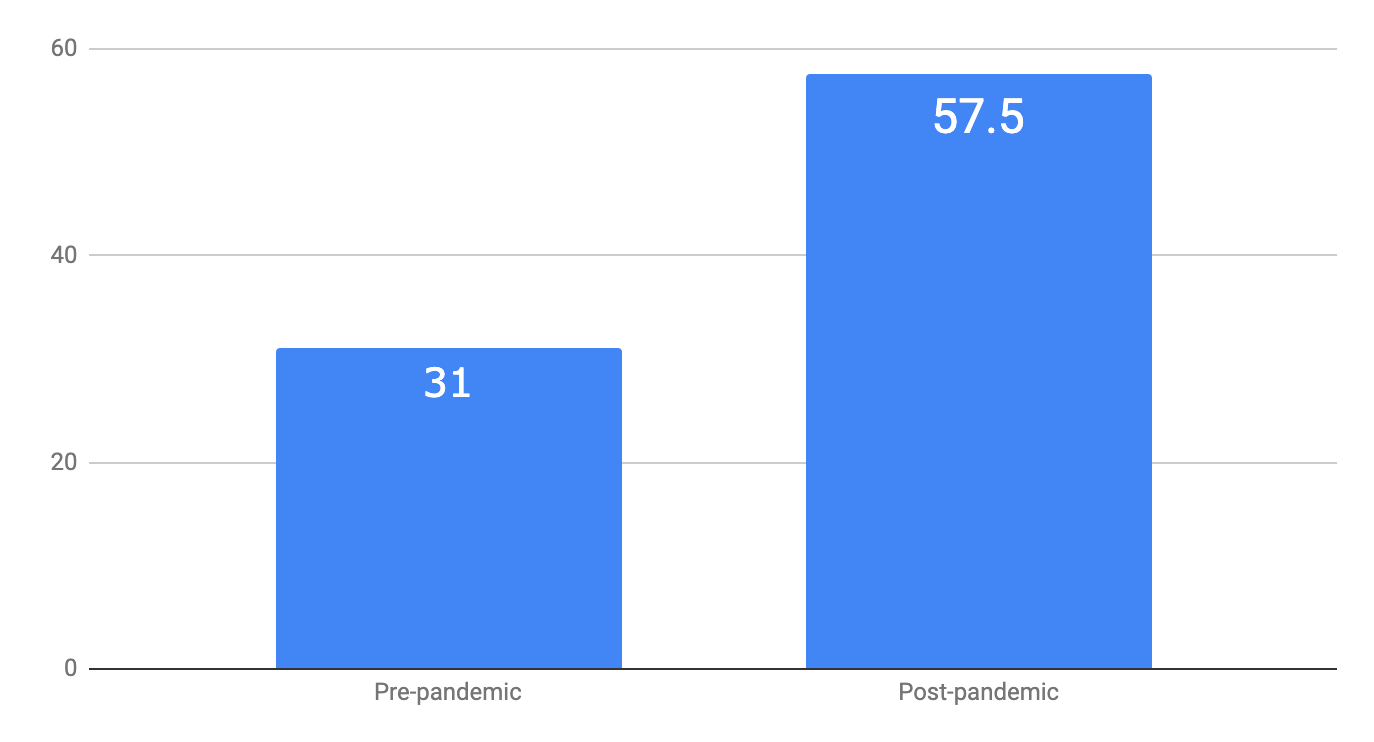
Lesson 3 – Sales: Never stop selling!
We didn’t believe that we would close any sales during the lockdown as all our potential customers would be focused on navigating the biggest crisis our industry has ever faced. That turned out not to be the case. Many potential customers felt they needed Tenzo more than ever to reopen even stronger! We even ran a marketing campaign on that theme.
We developed a new strategy in order to generate leads which relied on two key components:
-
Adapt to changing customer behaviours: For the first time in their lives, restaurateurs weren’t on the floor of a restaurant – they were all at home on their phones and computers. This led to a huge focus on content – we invested time to write guides and share insights to help our customers adapt to this new reality. This came in the form of our blog as well as our podcast. Some of our most read pieces include how to optimise your restaurant’s online presence, tips on starting dark kitchens, and how your Tenzo toolkit can support you. Our readership grew 8x over this period generating an incredible amount of high-quality leads (see graph below).
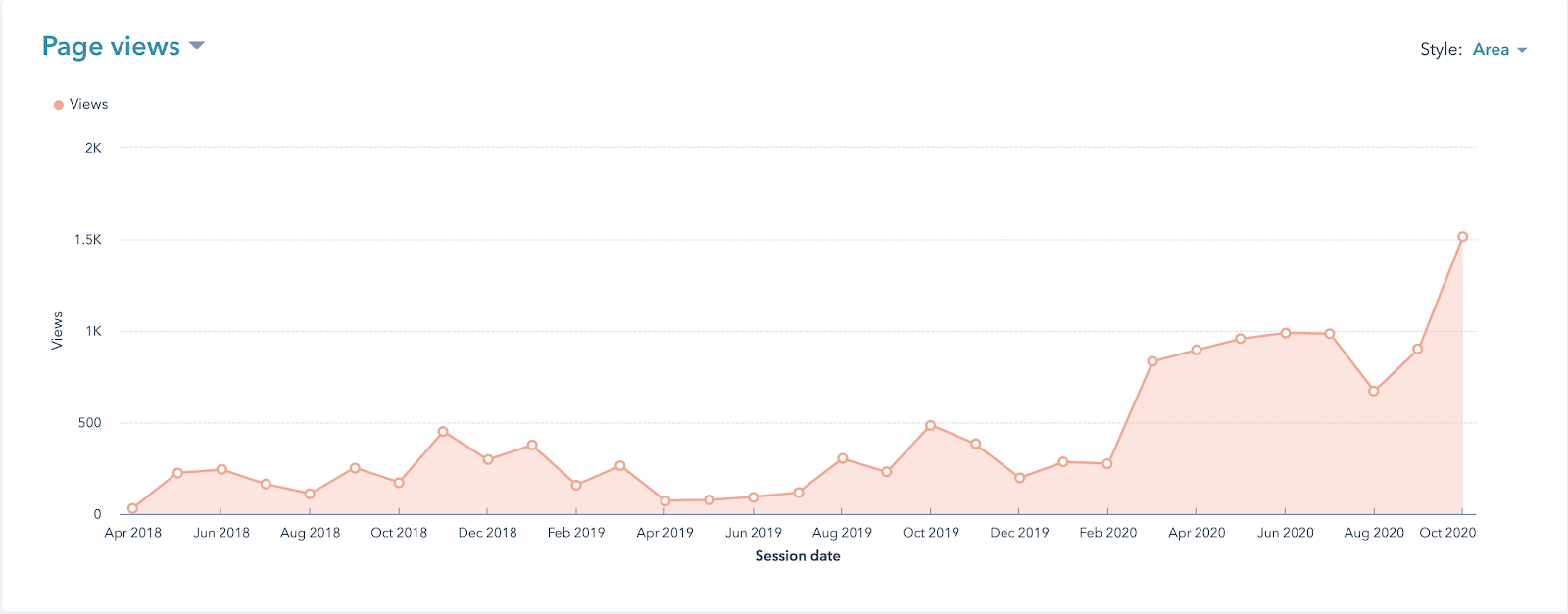
Find new sources of pain that you can help address: Partners are at the heart of what Tenzo does: we pull data from a number of partners, whether that’s the Point-Of-Sale (POS), the labour scheduler or the inventory tool, to bring together these sets of data in one unified view for our customers. What’s more, our partners were all hurting too – from POS companies laying off over 50% of their workforces, to inventory systems furloughing most of their staff – our friends were also in trouble. What this also meant was that they couldn’t solve all problems themselves anymore – they needed to partner to help fill gaps in their customers’ data needs (in analytics, or A.I.). We’ve capitalised on this by:
-
Working with a number of our close partners in various formats – webinars, podcasts, blogs, small campaigns, case studies, etc.
-
Launching a partner Slack to help ease communication amongst our partners –– again all working remotely. Partnership referrals is now our top lead source and we will be doubling down on this in 2021.
-
Follow the market as it evolves: In terms of customers, we have been focusing on three main targets where we’re seeing real growth:
-
Asia – although the explanations for why vary, it is clear from our customers that they are not feeling the impact of COVID as badly as Western nations. We now have a number of prospects, paid pilots and customers in Australia, Malaysia, Singapore & Hong Kong.
-
Dark or cloud kitchens – we’ve had a number of conversations with large cloud kitchen operators across the world and have been helping lots grow in the UK.
-
Enterprises – data that is coming out of China suggests that many mom & pop restaurants have closed down permanently but recognisable brands are thriving.
-
With a lot of people now working remotely, having customers jump on video calls for demos was no longer a hurdle meaning that we have continued to sign big deals including TGI Fridays in Australia, Nando’s in Malaysia, Bavet in Belgium, Taglia in Texas and Bujo Burger in Ireland.
Lesson 4 – Product: Look at where the ball is going
Turning to product, our advice would be twofold:
Create leverage for your teams: Product was increasingly becoming a bottleneck for us, and we wanted to make sure we could uncap our growth. Our sales and customer success teams need to be able to delight customers without worrying about whether the product could deliver. Specifically, we focused in two key areas:
-
Enable a self-signup flow: We want to make it possible for a customer to sign up to Tenzo without ever needing to talk to a sales person, reducing the burden on our Customer Success team, and driving revenue activation.
-
Develop a set of self serve tools: Our Customer Success team spend too long helping customers get set up, or completing simple administrative tasks. We’ve set out on a journey to ensure that customers can be completely self-sufficient – they shouldn’t need to talk to our success or support teams at all! We built tools including an admin portal, budget loader, report discovery tool and many others.
-
Build for the customers you want, not the customers you have: Here we had to ask ourselves how would we respond in this new world. Connected to the above customer trends this meant:
-
A product that worked in Asia – thankfully enabled by already being localised, but also pushed us for a greater focus on Asia focused integrations – GiveX, Bepoz, Micros, Deputy, etc.
-
Dark or cloud kitchen support – here we’ve worked with partners like Deliverect who are helping customers launch in a delivery world.
-
Get ready for Enterprise – specifically, we’ve been focused on:
-
-
-
OAuth / Single Sign-on (the ability for customers to use recognised sign-in services such as Google or Microsoft to avoid their users having multiple logins that they need to remember).
-
Sharding (the ability to break up one’s data into two or more smaller chunks, called logical shards, allowing us to scale infinitely).
-
Micro-services (to enable a more scalable approach).
-
Understanding that our biggest problem was getting data into Tenzo in a scalable way allowed us to focus on building our “data manager”, a tool that will enable us to load data into Tenzo more quickly, easily and accurately. Over the past 6 months we have spent a lot of time building out the ETL (Extract, Transform, Load) infrastructure that supports “data manager”.
Lesson 5 – Engineering: Scalability is key
Here we’ve focused on ensuring we are set to scale – but broadly this has revolved around 3 key areas:
Move everything to microservices: The old monolithic architecture has to die and we used the opportunity of fewer customers online to move to a completely new architecture. Our main services – which we will cover in future tech blogs are now:
-
Authentication service: responsible for managing authentication across all our microservices and providing single-sign-on, etc.
-
ETL (Extract, Transform, Load) service: enabling us to load data faster and more seamlessly than before.
-
Cards / Insight service: the heart of our analytics engine – showing whatever data you want!
-
Forecasting service: using A.I. to predict sales.
-
-
Embracing serverless: In an attempt to both make our cost structure more variable (needed in a volatile world!) and also enable us to super scale, we’ve migrated a decent portion of our workloads to serverless technologies – specifically AWS Lambda, and AWS Fargate.
-
Remove legacy code: As with any company, we have acquired technical debt over time that has hampered our ability to be nimble. Having some breathing room during lockdown enabled us to focus on some housekeeping.
The net of all of this is our engineering team now has created significantly more capacity – rather than spending days debugging legacy code, or solving requirements issues across services in a monolith – they’re now freed up to build the next great feature at Tenzo.
Lesson 6: Funding – Cash is King
We’re a venture-backed, loss making startup – as such, our bank balance is a critical dimension to our success. It’s the second most common reason startups fail.
In our relentless pursuit of more cash, we learned a few key lessons:
-
Good ideas still attract funding: We were successful in our application to Innovate UK to help restaurants minimise on food waste. We’re very excited at the prospect of partnering with Innovate UK to help the hospitality industry save over £100m in food waste by 2025, and a grant is clearly an attractive form of funding for Tenzo.
-
Look for cheap sources of capital: Whether it’s grants or loans, we found a lot of attractive opportunities for fundraising. Clearly governments in both the US and the UK had schemes available, and both helped – but we continue to look beyond just equity funding as a way to enable our growth.
-
Negotiate, negotiate, negotiate: It was also an opportunity to talk to our own vendors – through many supportive partners (that we won’t forget!) we were probably able to take 10-20% of our total cost base out without needing to impact our people.
-
Keep communicating: We’ve found that communicating regularly with existing investors has been hugely helpful – both in terms of assessing the landscape, but also knowing they had our backs if we needed help. Shout out in particular to Kent and S28 for their help.
Where did we end up?
So far — so good: we’ve come back in a big way:
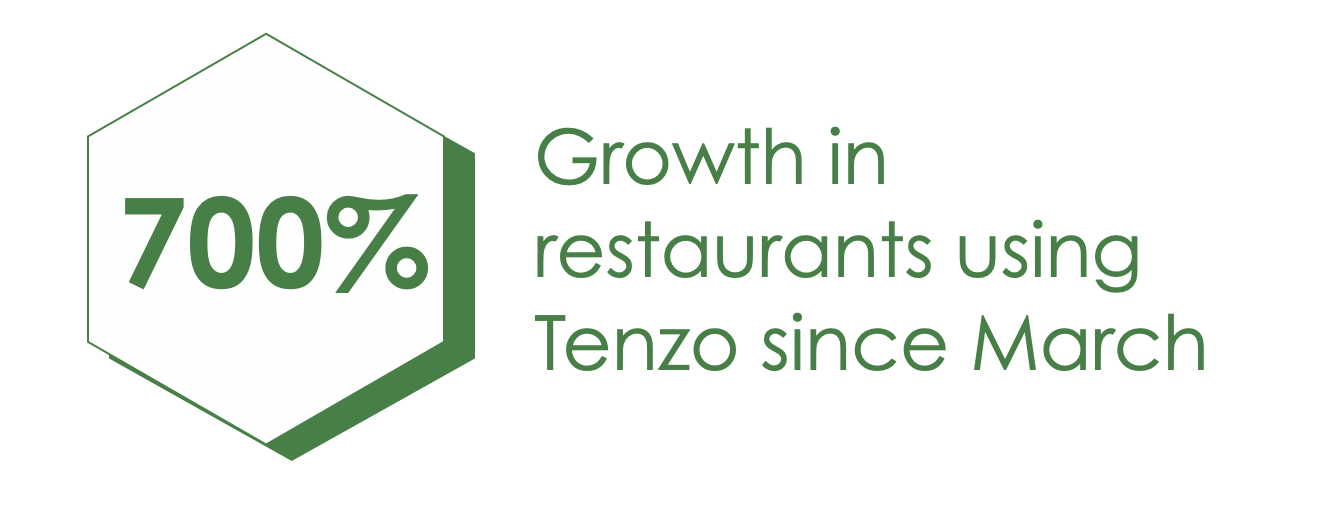
Beyond that, we’ve had a number of other big wins in 2020 which you can read about here.
What’s next?
Looking forward to 2021, we are more excited than ever about Tenzo’s prospects! We will finish the year with higher revenue than we started the year, we have secured funding from Innovate UK for our product, we’ve had great feedback from our customers, we have a number of ongoing conversations with global food brands as well as small & medium chains of restaurants and, most importantly, a wonderful team that works tirelessly to achieve these incredible results.
Cover Photo by Ethan Sykes on Unsplash


